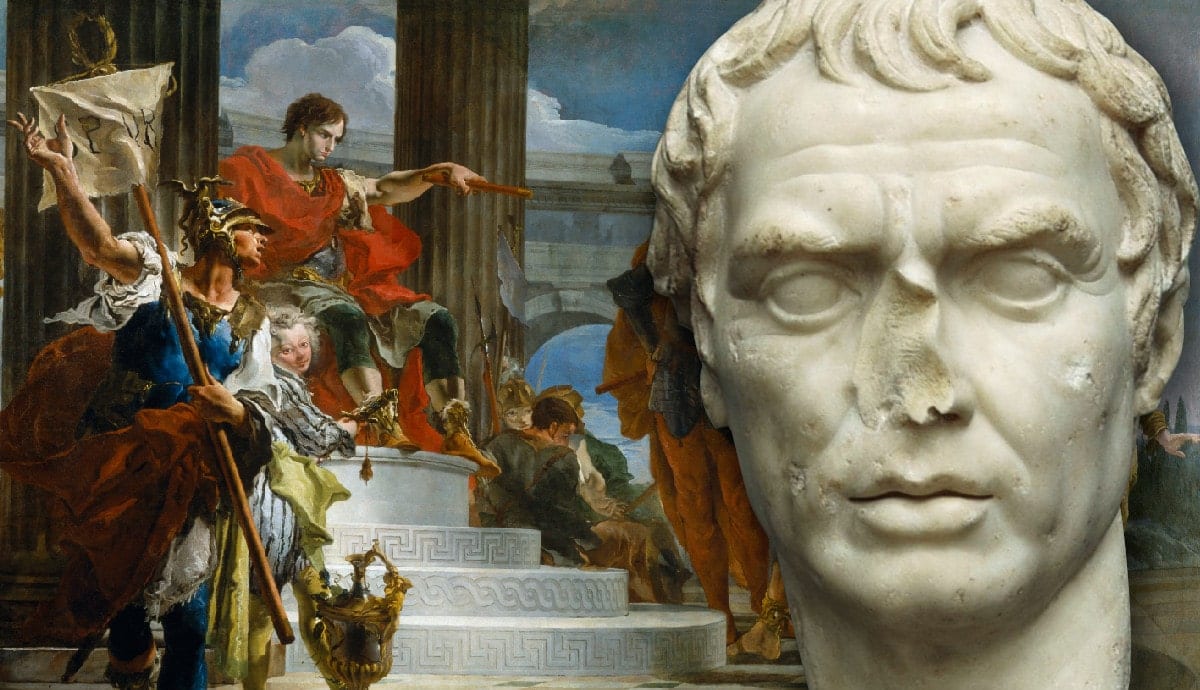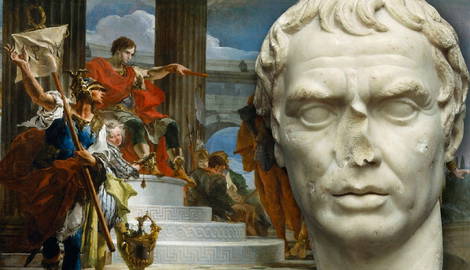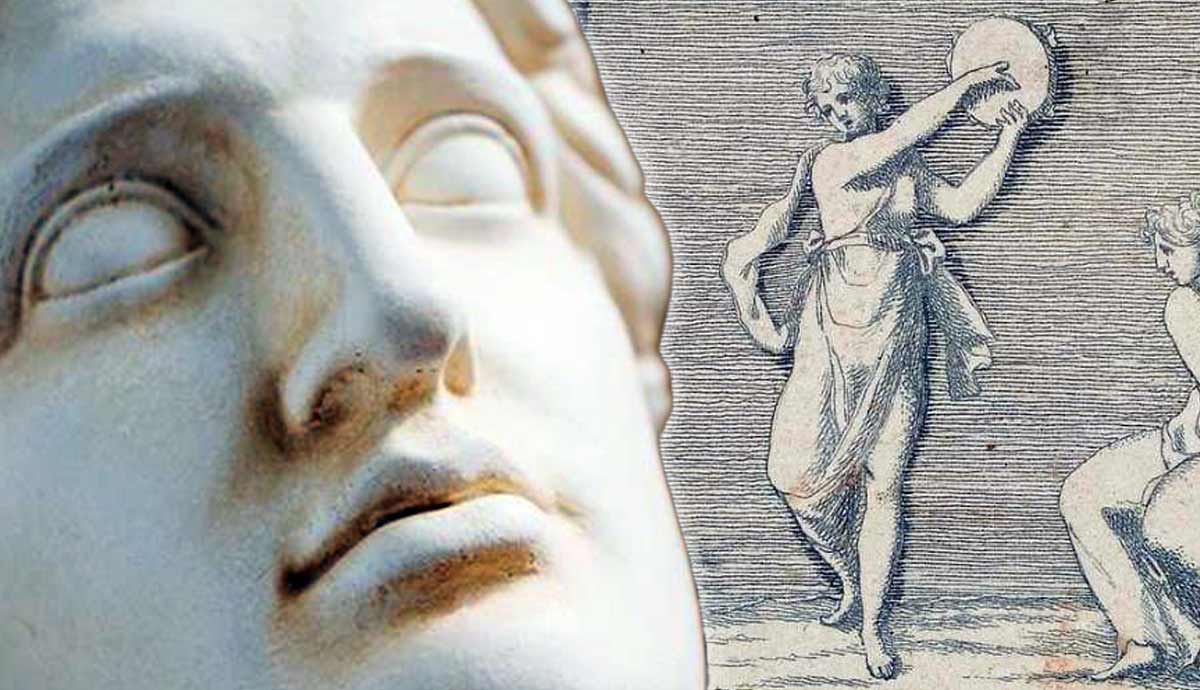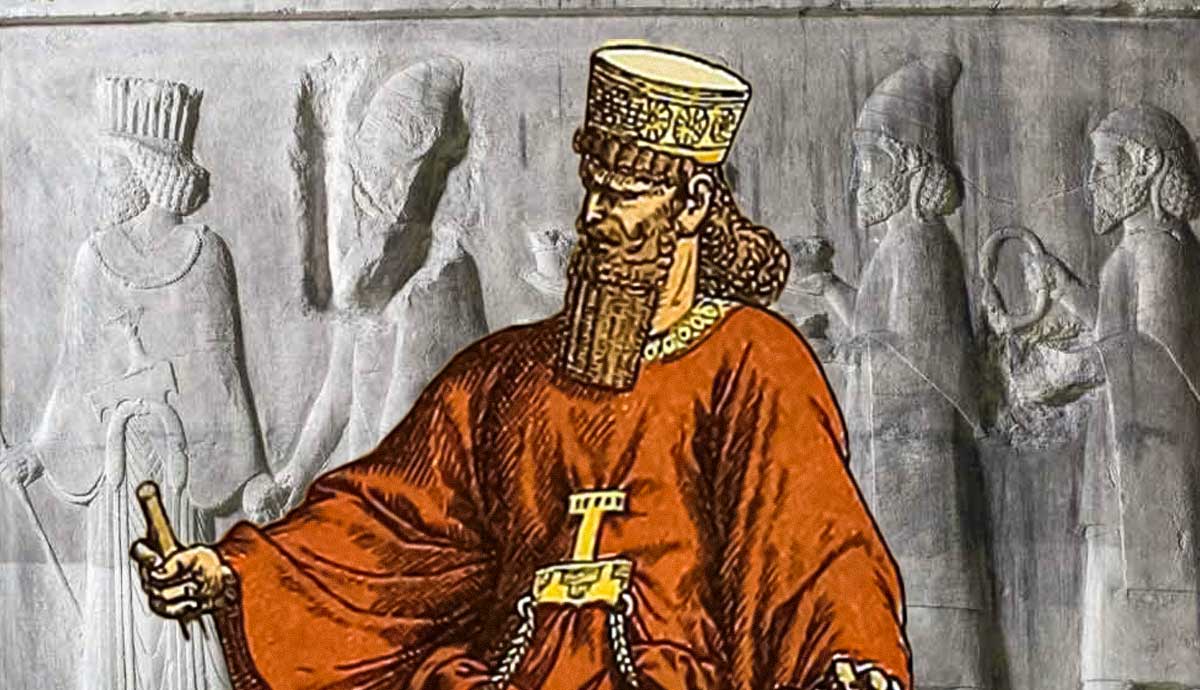
Publius Cornelius Scipio Africanus (236-183 BCE) had a fascinating life. Scipio’s youth was marked by one of the most traumatic events in Rome’s history – the invasion of Italy by Hannibal Barca. An eyewitness to the massacre at Cannae, Scipio spent the following years studying his nemesis – Hannibal – in order to eventually outwit the master-tactician.
After he deprived Hannibal of his power base in Spain, Scipio shocked everyone by striking at the heart of Carthage’s power — Africa. Scipio’s victory at the Battle of Zama turned him into a legend, earning him a moniker “Africanus.” His brilliant success, however, brought Scipio a fair share of enemies, including some of the most powerful men in Rome.
Instead of being acclaimed for saving Rome from the brink of disaster, Scipio was kicked out of the political arena and spent the last years of his life in his villa in seclusion. Ironically, history also neglected Scipio and his achievements, celebrating the deeds of Hannibal instead.
Scipio Africanus: First Encounter With Hannibal

Scipio Africanus was born Publius Cornelius Scipio around 236 BCE. He belonged to the gens Cornelia, one of the oldest and most prestigious Roman families. Nothing is known about his childhood, but as a member of the Roman elite, young Scipio would have been raised to be a statesman of the Roman Republic and would have entered military training at an early age. This training served him in good stead, allowing Scipio to become one of the greatest generals in the history of Rome.
Scipio was only 17 when the Second Punic War broke out in 218 BCE. The Carthaginian commander Hannibal Barca shocked Rome by advancing into Italy across the snowy Alpine peaks, traditionally considered unpassable. Hannibal shocked the Romans once again when his army soundly defeated the Roman legions at the battle of Ticinus. During the battle – consul Publius Cornelius – the Roman Army’s commander and Scipio’s father, found himself surrounded.
It was here that young Scipio distinguished himself for the first time, rallying the troops, and charging at a superior enemy to save his father. The enemy fled and Scipio was awarded an oak wreath (corona civica), which he refused. Bravery and humility would remain two qualities that Scipio retained throughout his life.

Ticinus was first in the series of Roman defeats that marked Hannibal’s advance through Italy. Roman discipline and logistics were no match for Hannibal’s brilliant tactical mind. Hannibal’s stratagems, ambushes, and traps doomed legion after legion during three years of bloody conflict.
Finally, in 216 BCE, Hannibal presided over the greatest military disaster in Roman history. At the battle of Cannae, around 50 000 Romans perished in a single day of fighting. One of the Roman commanders lost his life, while the other fled the battlefield. According to Livy, Scipio was one of the few surviving high-ranking officers. He displayed great leadership by organizing the largest group of survivors and leading them to safety.
For the Romans, Cannae was a horrific defeat. For Scipio, however, the battlefield was a place to learn about Hannibal’s tactics and strategy, which he would gradually adapt and employ to save Rome.
Scipio On The Offensive

The same year the Roman military had been crushed at Cannae, Scipio’s father, Publius Cornelius, returned to Spain. He believed that Hannibal could not be defeated by traditional strategies. Instead, the Roman armies had to strike the enemy’s most vulnerable point – its Spanish power base.
In 211 BCE, however, Scipio’s father perished in battle, leaving Rome in disarray. In Southern Italy, Hannibal was at large, while in Spain, the bulk of his Carthaginian army kept the Romans at bay. Rome bayed for revenge, but with so many aristocrats’ lives lost, few were keen on taking command. Then, young Scipio volunteered. The Senate gave him the position of proconsul, his military authority second only to the consul. Scipio was only 26 years old, unprecedentedly young for such a position, and he arrived in Spain with only modest reinforcements. His legions faced three Carthaginian armies led by Hannibal’s brother Hasdrubal, each larger than his own.
Instead of entrenching his forces, Scipio decided to strike directly at the enemy’s heart. Carthago Nova (present-day Cartagena) was the most important Carthaginian city in Spain – a formidable bastion considered to be impregnable. The city was surrounded by a natural lagoon and could be besieged via a narrow isthmus. Crafty Scipio, however, learned from some local fishermen that the lagoon could be crossed at low tide. Wading through the shallow waters at nighttime, Scipio led a surprise attack against the city and captured it.

The fall of Carthago Nova shifted the balance in Spain. The Romans now had a safe base of operations, a supply hub, and a source of military resources. More importantly, Scipio allowed his forces to loot the city but forbade them to massacre its inhabitants.
In addition, Scipio returned the noble hostages the Carthaginians had taken from Spain’s most powerful tribes, back to their homes. His tactic of clemency and kindness towards the locals, portraying Rome as a liberator, not the conqueror, would play a crucial role in his war against Carthage. As the Iberian war progressed, local forces kept joining the Roman army.
The Conqueror Of Spain

Over the next four years, Romans fought Carthaginian forces in Spain in a series of battles. In each of these engagements, Scipio employed the tactics he learned from Hannibal. In 208 BCE, in the battle of Baecula, Scipio used his signature pincer maneuver for the first time. Facing the numerically superior enemy, Scipio divided his main forces into two strong wings which fell upon the Carthaginian flanks. However, he failed to capture the enemy’s commander. Defeated, Hasdrubal and his remaining troops crossed the Pyrenees, planning to join his brother Hannibal. The Carthaginians arrived in Italy only to be destroyed by another Roman force, while Hasdrubal perished in the battle.

Scipio now had the upper hand in Spain, but Carthage still controlled two powerful armies. In 206 BCE, the Roman force, composed of around 45,000 men (half of them less disciplined troops) met the combined Carthaginian army at Ilipa, in southern Spain. The joint hostile force outnumbered the Romans, and its commanders, Hannibal’s brother Mago and another Hasdrubal felt confident of their victory.
However, they underestimated the sharp tactical mind of the Roman general. Instead of employing the usual order of battle, with the Roman heavy infantry in the center of the line, and the allied auxiliaries on its flanks, Scipio did the opposite. His Spanish allies formed the center bearing the shock of the advance of the heavily armed Carthaginian foot, while the heavy troops were placed on the ends of the line. As they approached the Carthaginians, the well-drilled Roman infantry advanced in a pincer movement, attacking less reliable enemy wings, and crushing their opponent. Only a sudden downpour saved the Carthaginian army from total annihilation. Both Mago and Hasdrubal were able to escape, but the Roman victory at Ilipa marked the end of the Carthaginian rule in Spain.
In four years, Scipio removed all Carthaginian forces from Spain although he had been outnumbered at every step. The Iberian Peninsula was on the way to becoming an exclusive Roman domain. But the fight was far from over.
Scipio Africanus

With Spain secured, Scipio returned to Rome where he received a hero’s welcome. Recognized for his achievements, in 205 BCE Scipio was granted the consulship, despite being too young for the post; he was only 30.
He was determined to defeat Hannibal. Scipio proposed a daring plan to the Senate. Instead of confronting Hannibal in southern Italy, he would take the war to Carthage’s home ground: Africa. This was a bold and risky plan, and the Senate was unwilling to approve of it. In addition, Scipio’s growing popularity frightened his political rivals who considered the young man a threat to the Republic.
In the end, Scipio prevailed. The Senate allowed him to use Sicily as a base of operation. Yet, they gave him only a limited number of troops – the troops no one else wanted. The army Scipio received for his African expedition was partly composed of the survivors of Cannae; disgraced and demoralized soldiers, scorned by their compatriots.
But the young general was resolute. In less than a year he drilled those men into shape. Further, he reminded them that the victory in Africa was their opportunity to redeem themselves. The disgraced veterans thus became a core of Scipio’s African army. The rest of the ranks were filled by Italic allies and volunteers.
In the summer of 204 BCE, Scipio’s expeditionary force numbering around 25,000 men landed on the shores of North Africa. A year later, the legions considered “second-rate” by the Roman aristocrats, defeated the combined armies of the Carthaginians and Numidians and seized the coastal city of Utica. The removal of the Numidian king Syphax shifted the power balance, as his rival Massinissa joined the Roman side. In one masterful stroke, Carthage lost its most important ally, and its very heart was now threatened by Roman legions.

As Scipio had expected, Carthage was forced to recall Hannibal from Italy. The stage was now set for the finale. In 202 BCE, the two greatest generals of their time finally met on the field of battle. Before the battle, two men met in private. Hannibal asked Scipio for peace, but the Roman general refused.
The Battle of Zama was a reversal of Cannae. Both sides were equal in number, around 40,000 men strong. The Romans, however, for the first time in the war commanded the superior Numidian cavalry. Hannibal intended to use his 80 war elephants to shock the Romans. Scipio, however, outplayed the master by opening wide lanes in Roman lines, neutralizing the threat of the fearsome beasts, who simply rushed through the corridors.
Taking the initiative, Scipio ordered Numidian and Roman cavalry to attack the Carthaginian horsemen protecting Hannibal’s flanks. Finally, the time arrived for Scipio to execute his signature pincer move and surround the enemy’s troops with his heavy infantry.
The survivors of Cannae got an opportunity to avenge their defeat. When Scipio’s cavalry returned from the chase, it hit the enemy from behind. The Carthaginian force collapsed. The apprentice surpassed the master. 20,000 Carthaginians were left dead on the sands of Zama. Realizing that the day is lost, Hannibal fled back to Carthage and urged surrender. The Second Punic War came to an end, with Rome triumphant.
A Sad Ending

After Zama, Carthage was reduced to an inferior status. It retained all of its African possessions, but it became a client state of Rome. Besides huge war reparations, Carthage was denied the ability to declare war on anyone, except in Africa, but with Roman permission. All its warships and war elephants were taken by Rome.Carthage’s most valuable ally, Numidia, was now Rome’s ally. Hannibal’s powerbase, Spain, was the Roman dominion.
The man who made this possible, the general who defeated the greatest enemy Rome had ever faced, was now known as Scipio Africanus. Only in his thirties, it seemed that Scipio had a bright future ahead of him. He was young, powerful, influential, and wealthy. He was adored by the army and by the Roman people. But the Roman system had no place for such a man. Designed to prevent any individual from gaining too much power, it limited the opportunities available for victorious commanders. The time of Sulla or Caesar was yet to come.
Having peaked so young, Scipio had no place left to rise. His entire life, Scipio remained humble. All he did was for the good of the Republic. But that was not enough for the senate and for Scipio’s powerful enemies. Following his second consulship, in 194 BCE, Scipio Africanus left the political arena.

Scipio’s last duty to the Republic came in 190 BCE when he accompanied his brother on a military campaign against Seleucid king Antiochus III. In the battle of Magnesia, the Roman legions used tactics devised by Scipio and won the day. Interestingly, Antiochus’ chief military advisor was no one other than Hannibal. Following the Roman victory, this once feared general fled the Seleucid court. For the rest of his life, Hannibal would avoid his Roman pursuers, outplaying one last time in 183 BCE, committing suicide by poison.
By a strange twist of fate, Publius Cornelius Scipio Africanus’ destiny mirrored that of his master. The savior of Rome died the same year as Rome’s worst nemesis. He was only 53-year-old. Scipio too, died in exile, albeit a self-imposed one, as a pariah of the Republic. Instead of receiving accolades following their triumph in Asia Minor, both Scipio and his brother were accused of taking bribes they supposedly received from king Antiochus.
According to Livy, Scipio tore up the account books as well as the indictment on the floor of the senate. He then reminded his accusers that he was being tried on the anniversary of his victory at Zama. The popular outcry forced his enemies to drop the charges, but the senatorial inquiry continued, further embittering Scipio. Finally, he retired for good and withdrew into the seclusion of his private villa. Scipio’s disgust with Rome’s response to his years of service was reflected in the epitaph inscribed on his tomb:
“Ungrateful fatherland – You will not even get my bones.”
It was a sad anticlimactic end for one of Rome’s greatest Generals.
Scipio Africanus: Rome’s Greatest General?

Publius Cornelius Scipio Africanus was perhaps the greatest of Rome’s generals. He was a man who never lost a battle, and who defeated the most dangerous enemy Rome had ever faced. From his first combat experience at Ticinus, it was clear that the young boy was a skilled warrior and talented commander. He proved that over and over again. Scipio broke the spine of the Carthaginian power in Spain, obtaining for Rome its first territory outside Italy. From the demoralized and scorned survivors of Cannae, he made a well-disciplined and trained military that not only challenged the Carthaginians at their home ground, but defeated their greatest war hero, Hannibal.
Only in his thirties, Scipio Africanus gave Rome its greatest triumph and set the stage for a future Empire. Scipio’s actions, military and diplomatic, laid the foundation for the Roman expansion into Africa and Asia, and their mastery over the Mediterranean. Ironically, Scipio’s astounding success was to be his undoing.
A general who never tasted defeat, a man adored by both the army and populace, remained humble, turning away from temptations of personal ambitions. But this was not enough for his political rivals, jealous of his achievements and his popularity, they worried that Scipio could take that last step, and take the power all for himself.
Embittered by ingratitude shown by the Roman senators, men who never had seen the battlefield, Scipio retired from public life, spending the last years of his incredibly productive life in seclusion. His fall from grace mirrored that of his nemesis and master, Hannibal. And in a cruel twist of history, Scipio Africanus, the man who gave Rome its empire, is nowadays overshadowed by Hannibal, the man he defeated.

A story by Livy tells us of the meeting between Scipio Africanus and Hannibal, years after Zama. During their conversation, Scipio asked the Carthaginian who he thought was the greatest general of all time. Hannibal mentioned Alexander the Great as the first, Pyrrhus as the second, and in third place he put himself.
Scipio burst out laughing, asking Hannibal what he would say if he was the one who defeated Scipio. “In that case”, replied Hannibal, “I should certainly put myself before Alexander and before Pyhrrus – in fact before all other generals!”
The story is probably apocryphal, but it perfectly depicts Rome’s greatest general. Hannibal was a witty and intelligent man. In praising himself, he subtly admitted Scipio’s greatness. No matter how great general Hannibal had been, he was ultimately defeated by someone greater than him. By Scipio Africanus.










